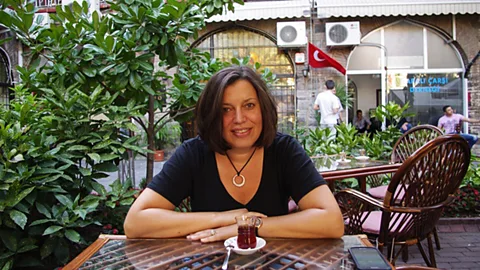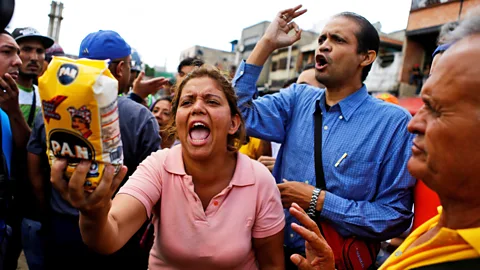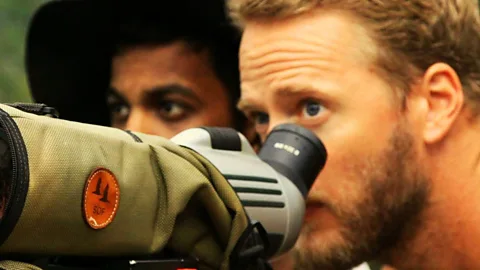
Why every expat needs an exit plan
[ad_1]
 Terry Henson Kaymak
Terry Henson KaymakYour overseas assignment was fantastic until the failed coup and the food shortages kicked in. How do you know when it’s time to go versus sticking with it?
In mid-July, American Terry Henson Kaymak found herself stuck in the middle of a failed coup when a faction within the Turkish Armed Forces attempted to overthrow the government of President Recep Tayyip Erdogan.
The attempted coup “happened right over my head”, says the 51-year-old lawyer, who has lived and worked in the Turkish capital of Ankara for more than six years in a building that’s close to the army headquarters and even closer to parliament.
On 20 July, Turkey declared a three-month state of emergency and Kaymak says she’s on high alert and no longer speaks English on the streets because she feels “anti-American sentiment is growing”.
 Terry Henson Kaymak
Terry Henson Kaymak“I’m not a person who scares easily, but I’m barely going out of my house right now,” she says.
The latest unrest was the culmination of a rough year for Kaymak, who lives within earshot of the bombs that went off this February and March during separate terrorist attacks that killed a combined 67 people. The Philadelphia native plans to move back to the US in September.
Some foreigners are now going through a process of reassessing their lives in Turkey thanks to a string of terrorist attacks over the past year and increasing political instability. The economic outlook, once rosy, is also souring amid the turmoil. Economists cut their growth forecasts for Turkey in 2016 and the lira slumped to a near-record low on July 20 of 3.07 against the US dollar. This instability is leading many expats to leave.
 Getty Images
Getty ImagesExpats in Turkey aren’t alone. A growing number of foreign workers in places like China and the United Arab Emirates have returned home in recent months due to sluggish economic growth, but for expats in places like Turkey, Brazil or Venezuela, political instability adds yet another layer of insecurity. In Brazil, there was a 62% decrease in foreign worker permits granted in the first trimester of 2016, compared with the same period in 2014, due to a lack of foreign interest and fewer available jobs.
Many find themselves asking whether it’s time to move out of the country or if they should stick it out through the troubles. Knowing the difference isn’t easy and is complicated by family ties, jobs, school terms and more. So, how does an expat decide the time has come to pack their bags?
‘No foreseeable solution’
No clear way forward is one “go” red flag. For instance, foreign workers in Venezuela might want to prepare an exit plan, according to Cynthia Arnson, director of the Latin America programme at the non-partisan Woodrow Wilson International Center for Scholars.
“The Venezuelan economy has not hit rock bottom and will continue to deteriorate, and that has a great potential for sparking ongoing violence, food riots and the kind of things that are already taking place,” Arnson explains. “There is no foreseeable solution on the horizon and the economy has really sharply deteriorated.”
 Getty Images
Getty ImagesThe International Monetary Fund estimates that the economy will shrink by 10% this year after contracting 6.2% in 2015, making Venezuela the world’s worst performing economy. Venezuela relies on oil revenue for most of its financial health, but government-controlled oil production is way down, while per barrel oil prices are near record lows after years of high process. In turn, supplies (including medicine) are scarce, and the army has taken charge of food distribution in some places.
Now, most foreign and native oil executives have relocated over the last decade to Colombia, Houston in the US or Calgary in Canada, according to Antonio Sanchez of global headhunting firm Boyden. Their absence has exacerbated industry productivity problems, while low oil prices strain the economy overall.
Why expats stay in hard places
Caracas ranked as the world’s most dangerous city in 2015 with 120 homicides per 100,000 inhabitants, according to Mexican NGO, Citizen’s Council for Public Security and Criminal Justice (CCSPJP). CCSPJP put the nationwide murder rate at 80 homicides per 100,000 inhabitants, though the government has refuted those figures.
 John Kvarnback
John KvarnbackEven so, John Kvarnback, a Swedish biologist who lives in the affluent Los Palos Grandes neighbourhood, says he doesn’t feel that Caracas is that much more unsafe than when he moved to the city in 2001. There are more roadblocks around the city and the 43-year-old doesn’t leave the house with his iPhone or a full wallet, for fear of having them stolen.
“I haven’t had any guns pointed to my head like I did [here] many years ago,” he says.
Because Kvarnback earns his income in foreign currency he can afford to purchase goods at higher prices than Venezuelans earning a living in bolívars. Consequently, he’s less affected by the food shortages and other daily hardships. Still, his primary work as a nature guide has all but dried up amid a lack of tourists, and he estimates that about 80% of his friends have left the country over the past two years.
In the end, however, Kvarnback might follow the lead of his ex-wife and son and move to Brazil where there is similar fauna and more tourism. He knows Brazil’s economy is suffering at the moment, and that many foreign workers are trying to leave, but for him, it could actually be a move up the wobbly scale of economic uncertainty.
[ad_2]
Source link





